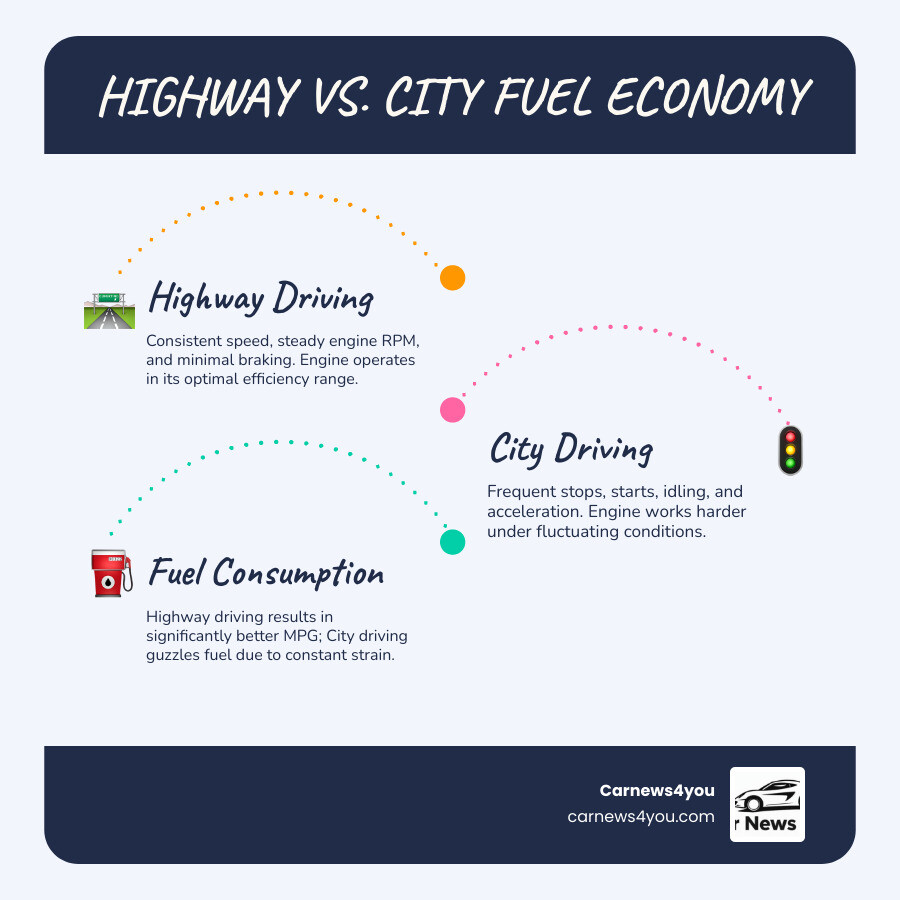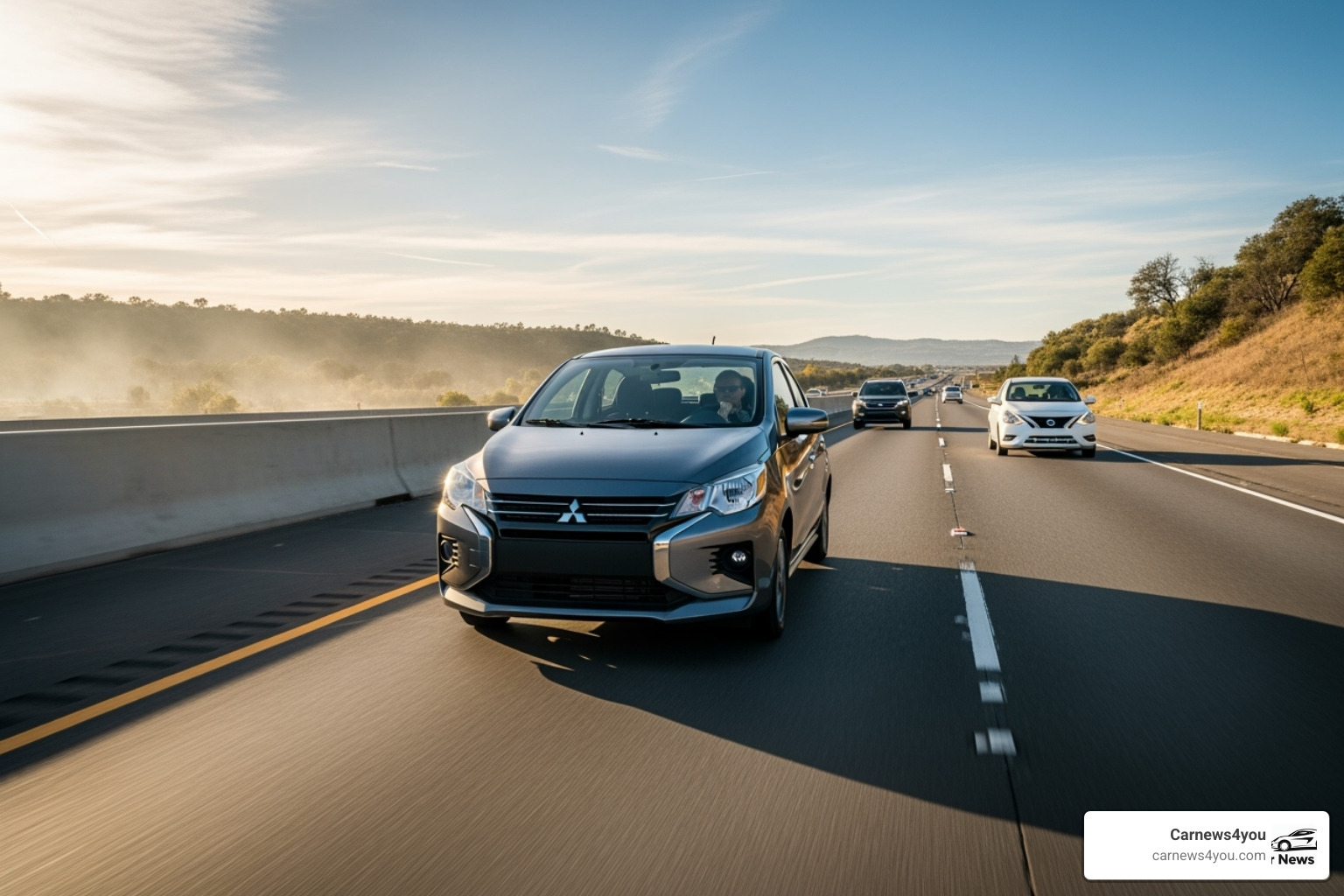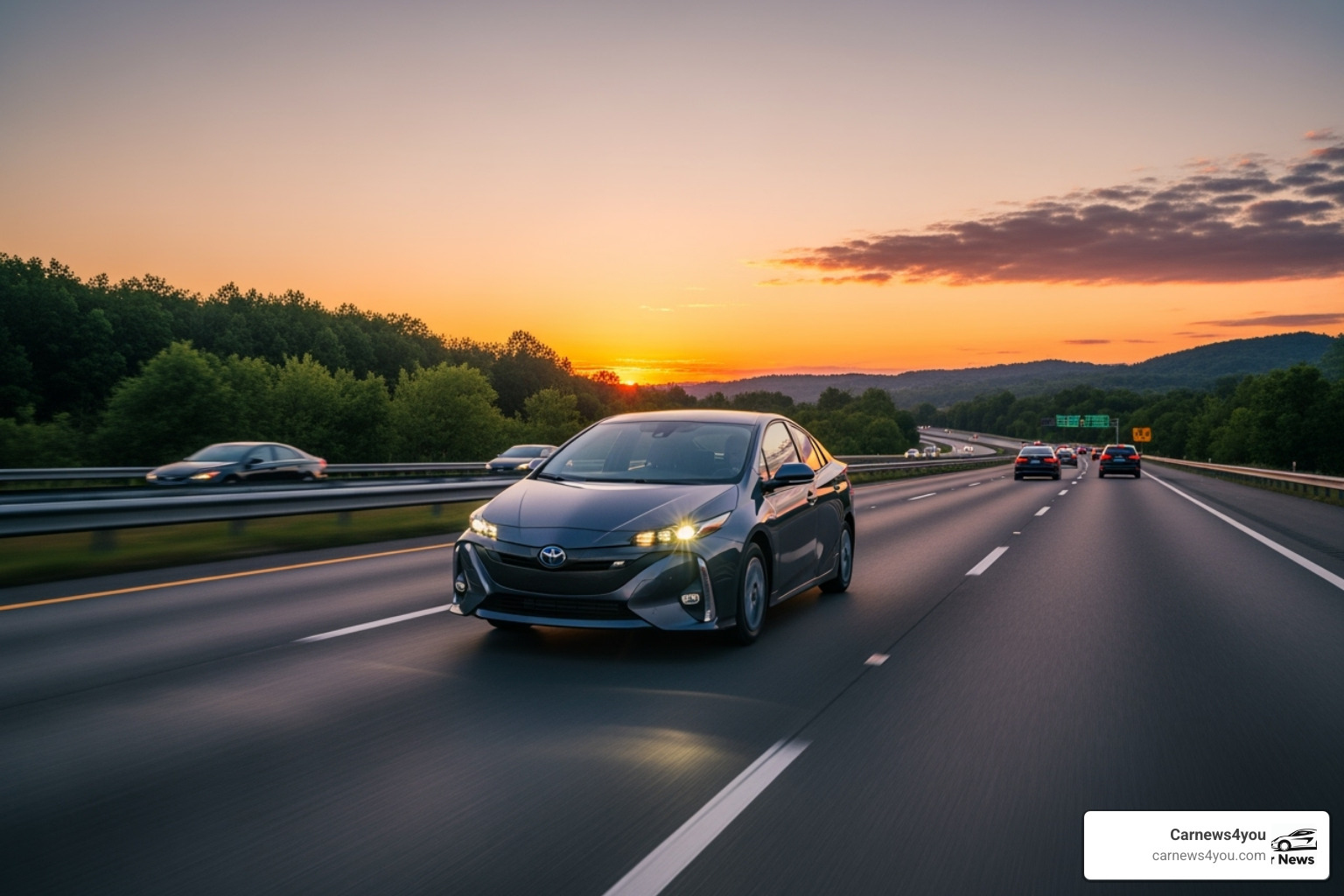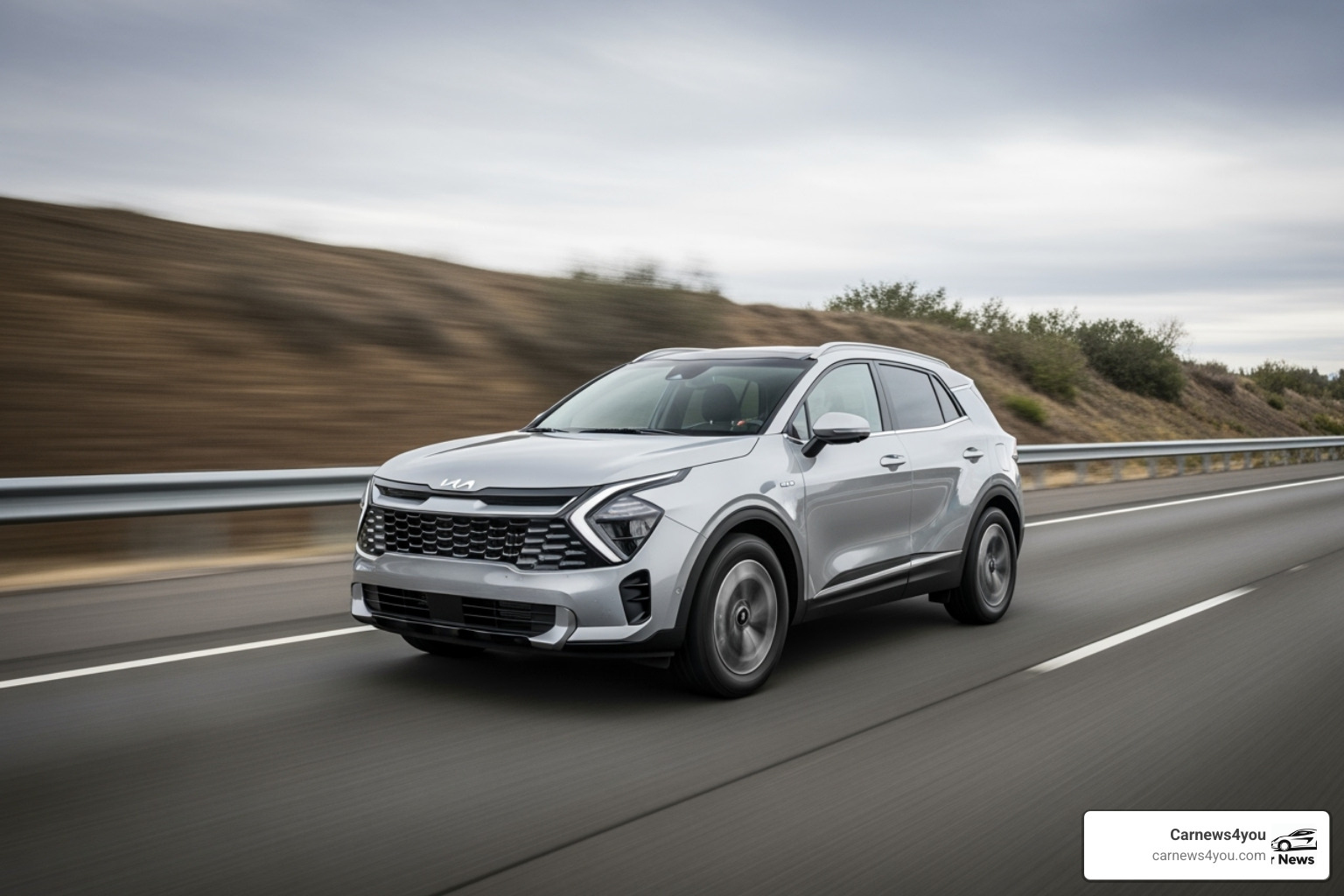Highway Mileage Cars: Top 5 Best for 2025
Why Understanding Highway Mileage Matters More Than You Think
Ever wonder why your car seems to sip fuel on long highway trips but guzzles gas during your daily commute? The difference between highway and city fuel economy can be dramatic—often 10-15 MPG or more. While most drivers focus on combined MPG ratings, understanding these differences could save you hundreds of dollars at the pump each year if you’re a frequent highway traveler.
The science behind this is straightforward. Highway driving allows your engine to operate in its sweet spot—maintaining steady RPMs without the constant stress of city traffic, which forces your engine to work harder and burn more fuel.
Whether you’re planning cross-country road trips or just have a long daily commute, choosing the right highway mileage car can transform your driving experience. Some vehicles, like the 2024 Porsche Panamera, can travel an impressive 750 miles on a single tank at highway speeds.

Why Highway and City MPG Are Worlds Apart
The EPA provides three fuel economy numbers: city, highway, and combined. These reflect the real differences in how an engine performs under various conditions. City driving is a frantic workout of starts and stops, while highway driving is a steady, efficient cruise.
| Factor | Highway Driving | City Driving |
|---|---|---|
| Speed | Consistent/High | Variable/Low |
| Braking | Infrequent | Frequent |
| Acceleration | Gradual/Steady | Frequent/Variable |
| Engine Load | Steady, Optimal | Fluctuating, often inefficient |
| Aerodynamics | Highly impactful | Less impactful at low speeds |
| Idling | Minimal | Significant |
For more details, you can review official EPA fuel economy information or check our guide to the Best Car for Long Highway Commute.
The Science of Highway Fuel Efficiency
When cruising at a steady 65 mph, your engine finds its sweet spot, operating at its most efficient RPM range. Aerodynamic drag is the main challenge at high speeds, which is why highway mileage cars often have sleek designs. Modern transmissions, especially Continuously Variable Transmissions (CVTs), are also key, as they keep the engine in that perfect efficiency zone. Even simple things like maintaining proper tire pressure can boost highway MPG by reducing rolling resistance. Learn more about the principles in our Race Car Aerodynamics Explained article.
The Stop-and-Go Strain of City Driving
City driving is the fuel economy villain. Idling at red lights wastes fuel, acceleration from every stop forces the engine to work overtime, and braking converts energy into wasted heat. This is where hybrids shine. Cars like the Toyota Prius use regenerative braking to capture that lost energy and convert it into electricity. The hybrid advantage in the city is significant, as they can run on electric power at low speeds, reducing the engine stress that also impacts long-term vehicle health.
Top Performers: The Best Highway Mileage Cars of 2025
When hunting for the perfect highway mileage cars, some models stand out. The 2024 Hyundai Elantra Hybrid leads with an impressive 54 highway MPG, closely followed by the 2024 Toyota Prius and 2024 Kia Niro Hybrid, both at 53 MPG. For those wanting a larger sedan, the 2024 Honda Accord Hybrid offers 48 highway MPG with a spacious, comfortable cabin. Even the non-hybrid 2024 Mitsubishi Mirage is a champion with 39 highway MPG, making it a budget-friendly choice. These numbers translate to real savings, especially for frequent highway travelers. For more options, see our guide on Fuel Efficient SUVs.
Fuel Sippers on a Budget

For those on a budget, the Mitsubishi Mirage is a top choice with 39 combined MPG. It’s affordable, reliable, and incredibly thrifty. The Nissan Versa offers more refinement with a solid 30-35 combined MPG. The standard Hyundai Elantra is another great option, delivering good fuel economy (31-54 combined MPG depending on trim) and plenty of tech features.
The Mid-Range Mileage Champions
This category offers a sweet spot of efficiency and comfort. The Toyota Corolla is a reliable choice, with the Cross Hybrid AWD variant getting 42 combined MPG. The returning 2025 Honda Civic Hybrid promises an exciting 49 combined MPG with 200 horsepower. The Hyundai Sonata hybrid boasts 47 combined MPG and an incredible 670-mile highway range. Finally, the all-new 2025 Toyota Camry is expected to continue its legacy of hybrid excellence. For more on this class, see our guide to the Best Highway Cars.
Premium Efficiency: Hybrids and Luxury Models

Premium highway mileage cars blend luxury with great fuel economy. The redesigned 2024 Toyota Prius combines a futuristic look with up to 57 combined MPG. The Lexus ES 300h offers premium comfort with 42.7 combined MPG. Plug-in Hybrids (PHEVs) like the 2024 Toyota Prius Prime (114-127 combined MPGe) offer the ultimate flexibility, allowing for all-electric daily commutes and gasoline for long trips. Find out What Hybrid Car Gets the Best Highway Mileage? or explore the Eco Luxury Car Trend.
Choosing Your Champion: Sedans, SUVs, and the EV Question
Picking the perfect highway mileage car involves more than just MPG; the vehicle type—sedan, SUV, or EV—matters. Sedans have historically been the most efficient, but modern SUVs are catching up, and EVs are changing the game entirely. For long journeys, range is as critical as efficiency. Find more tips in our guide to Best Cars for Road Trips.
The Aerodynamic Advantage of Sedans
Sedans excel at highway mileage because their sleek, low profiles are designed to cut through the air. At high speeds, wind resistance is a major force, and a sedan’s shape reduces this drag, meaning the engine works less. Sedans are also typically lighter than SUVs, which further improves efficiency. The Honda Accord and Toyota Camry are prime examples of this winning combination.
Can SUVs and Trucks Be Highway Mileage Cars?

Yes, thanks to modern technology. The Kia Sportage Hybrid (43 combined MPG) and Toyota RAV4 Hybrid (39 combined MPG) now compete with many sedans. For trucks, the Ford Maverick Hybrid offers great utility without the fuel penalty. Diesel engines remain an efficient choice for larger trucks on long highway runs. Fuel tank size also plays a role; the Toyota Tundra Hybrid uses its large 32.2-gallon tank to achieve an impressive range. See more options in our Best Compact SUV for Road Trips guide.
Hybrids vs. EVs: The Highway Range Equation
This is where the conversation shifts from MPG to overall travel strategy. Hybrids offer electric motor efficiency with the unlimited range of a gas tank, like the Hyundai Sonata Hybrid which can travel 670 miles on a tank. Electric vehicles (EVs), measured in MPGe, excel in the city but can be less efficient at sustained highway speeds. While range anxiety and the need to plan charging stops are factors, the charging network is growing rapidly, making EVs increasingly viable for highway travel. For more on this topic, explore our Electric Vehicles section.
Beyond the Sticker: Real-World Factors Affecting Your Mileage
The EPA numbers on window stickers are a great starting point, but they’re based on controlled lab tests. Your real-world mileage will vary based on several factors. Understanding these can help you get the most out of your highway mileage car. For maintenance advice, see our Car Maintenance Tips and learn more about efficiency at the Department of Energy’s site Learn more about vehicle efficiency.
How Your Driving Habits Impact Fuel Use
Your right foot is the biggest factor in your fuel economy, potentially swinging your MPG by 10-15 points. Aggressive driving with rapid starts wastes fuel. Speeding also hurts efficiency; most cars are most efficient between 55-65 mph. Above that, aerodynamic drag increases fuel consumption significantly. Cruise control is great on flat highways but can be inefficient on hills. Smooth acceleration and coasting to a stop are key fuel-saving techniques.
The Role of Maintenance and Environment
Your car’s condition and its surroundings play a huge role. Tire pressure is crucial; underinflated tires increase rolling resistance and can cost you 2-3 MPG. Regular oil changes and a clean air filter keep your engine running smoothly. Terrain and weather also have a major impact—driving in mountains or into a strong headwind will always use more fuel. Finally, reduce vehicle load by removing unnecessary items, including roof racks, to make your engine’s job easier.
Frequently Asked Questions about Highway Fuel Economy
Here are answers to some of the most common questions we get about highway fuel economy.
How has highway fuel efficiency evolved over the last decade?
The evolution has been incredible. Key advancements include engine downsizing with turbocharging, allowing smaller engines to be both powerful and efficient. Hybrid technology is now widespread, available in everything from sedans to trucks. Aerodynamics have improved with features like active grille shutters, and the use of lightweight materials reduces vehicle weight. Modern 8, 9, and 10-speed transmissions and CVTs keep engines in their most efficient RPM range. For a look at what’s next, see Future Car Innovations.
What’s more important for long trips: high MPG or a large fuel tank?
Both matter, but for long trips, total highway range (the combination of both) is the most practical metric. High MPG saves money on every mile, while a large fuel tank provides convenience by extending the time between stops. A car with high MPG and a standard tank often provides a better balance of cost and convenience than a gas-guzzler with a huge tank. The ideal vehicle, like the 2024 Porsche Panamera, combines both for an exceptional range.
Is it worth prioritizing highway mileage over other features?
For frequent highway drivers, yes. The fuel savings can be substantial, and efficient cars tend to have better resale value. The trade-offs can include less power in some budget models, though many modern hybrids offer peppy acceleration. You might also face size limitations, as sedans are often the most efficient. While there can be a higher upfront cost for hybrids, it’s often recouped in fuel savings. For most long-distance drivers, prioritizing efficiency is a smart financial decision, but it’s important to balance it with your need for features like comfort. Find out more about what makes a Comfortable Car for Long Drive.
Conclusion
Choosing a highway mileage car is about more than just the EPA sticker; it’s about matching a vehicle to your driving style. We’ve seen how highway driving allows an engine to operate in its efficient sweet spot, unlike the fuel-guzzling nature of stop-and-go city traffic.
The options are vast, from the budget-friendly Mitsubishi Mirage to the sophisticated Toyota Prius, with balanced champions like the Honda Civic and Toyota Camry in between. Excitingly, the category now includes efficient SUVs like the Kia Sportage Hybrid and trucks like the Ford Maverick Hybrid, proving practicality and efficiency can coexist.
Your habits and maintenance also play a huge role. By understanding these factors, you can take control of your fuel costs and transform your driving experience.
Ready to find the perfect fuel-efficient companion? Find the Best Highway Gas Mileage Car for you and see which vehicle will best serve your highway trips while keeping your wallet happy.







